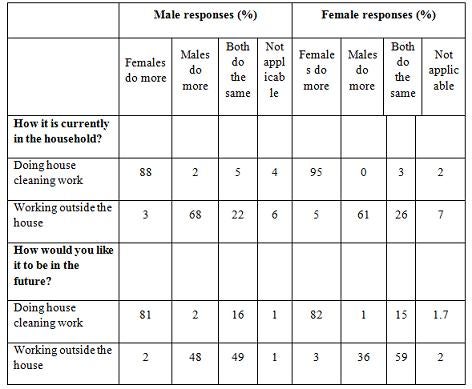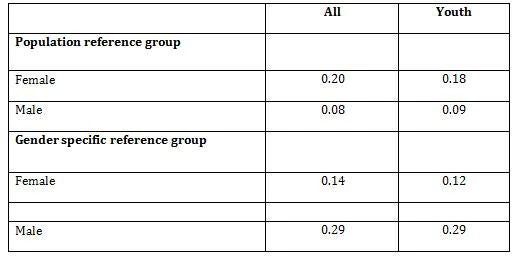Work is central to people’s lives and identity. For many, participating in the labor market is important beyond its obvious economic rewards as it also provides a sense of purpose and fulfillment. Conversely, labor deprivation impedes economic growth and leads to a feeling of emptiness and exclusion.
Yet, it is not uncommon to see large differences in attitudes towards employment across social groups. Urban residents, for example, are typically louder in voicing their labor market complaints than rural residents, even though living conditions in rural areas are known to be worse. And, in many societies, women and men have very different attitudes towards employment, leading to different emotional outcomes during recessions and joblessness.
How can we account for the difference between objective and subjective conditions of deprivation? And what role does gender play in this?
This is the theme explored in our paper, “Who Is Deprived? Who Feels Deprived?,” that applies a recently developed measure of relative labor deprivation to study labor deprivation in Morocco. The paper also looks at the existing gender gap in Moroccan labor markets to better understand objective and subjective labor deprivation. In Morocco, women suffer from an extremely low Labor Force Participation Rate (LFPR) estimated to be around 25% only. This is about a third of the LFPR for men. And, yet, women do not seem to voice their labor market grievances in a proportion comparable to their actual labor deprivation.
A recent World Bank study found that an overwhelming majority of both female and male interviewees believed men to be relatively more deprived than women in the domestic labor market. Focus group participants held the view that for men employment was an economic and social imperative, while for women it was more of a choice. Even among youth, most men and women believed that women should perform more household tasks than men, despite the fact that, on average, young women do far more housework than young men (Table 1).
Table 1 – Gender Preferences for Work inside and Outside the Home
These responses reveal strong gender norms related to the distribution of work across genders, both inside and outside the home, and are similar to those documented by Akerlof and Kranton (2000) for other parts of the world. Akerlof and Kranton’s work shows that, if the society views women’s role as “housewives” and men’s role as “breadwinner”, then women would be hesitant to join the labor force in greater numbers as this could potentially “evoke anxiety and discomfort in oneself. “ On the other hand, men will see female participation in the labor force as a “threat” to their own male identity. To the degree that these factors influence women’s participation decisions, they can help to explain why female labor force participation rates remain so low and, at the same time, why many women may not feel as distressed as men by the lack of employment.
Does gender define the reference group? If gender is a strong feature of identity, then gender is also an important determinant of the reference group, the group of peers people compare themselves with. This would suggest that sentiments of labor deprivation arise by means of within gender comparisons rather than between genders comparisons.
This is indeed what we find. When we assume that women and men compare themselves with both genders, we find women to be about three times more relatively deprived than men. This is what measures of objective deprivation such as the LFPR would suggest. If, instead, women and men limit their own reference group to their own gender, we find that men are about two times as relatively deprived as women. This conforms to the general observation that women tend to complain less than men about their labor market status despite higher objective deprivation levels. By using gender specific reference groups, we are able to better capture feelings of deprivation as opposed to objective conditions of deprivation.
Table 2 - Relative Labor Deprivation Index
The paper also finds that the measure of relative labor deprivation proposed is a good predictor of subjective deprivation as it is strongly associated with subjective responses on social status and emigration. For example, the satisfaction levels reported by youth regarding their opportunities to improve their social status in the future are inversely related to the paper’s estimated levels of relative labor deprivation. And the relative labor deprivation measure improves its prediction capacity when the reference group is constructed across gender lines.
Do these findings matter for policy? In theory, policy should be guided by objective conditions of deprivation, not by subjective feelings. Economic policies should be concerned about reducing unemployment rather than distributing jobs to louder groups who in fact may be less objectively deprived. So, why should we care about subjective feelings? Because governments and politicians do care about subjective feelings and often design policies to appease subjective rather than objective deprivations. The methodology proposed in the paper highlights this objective-subjective divide and can help governments design policies that are responsive to the objective conditions of deprivation while also being cognizant of peoples’ sentiments. More importantly, if gender norms affect the perception of deprivation and the voice associated with perceptions, then changes in gender norms can change perceptions and voice, which in turn can aid governments and politicians’ focus on the issue of female labor deprivation.




Join the Conversation